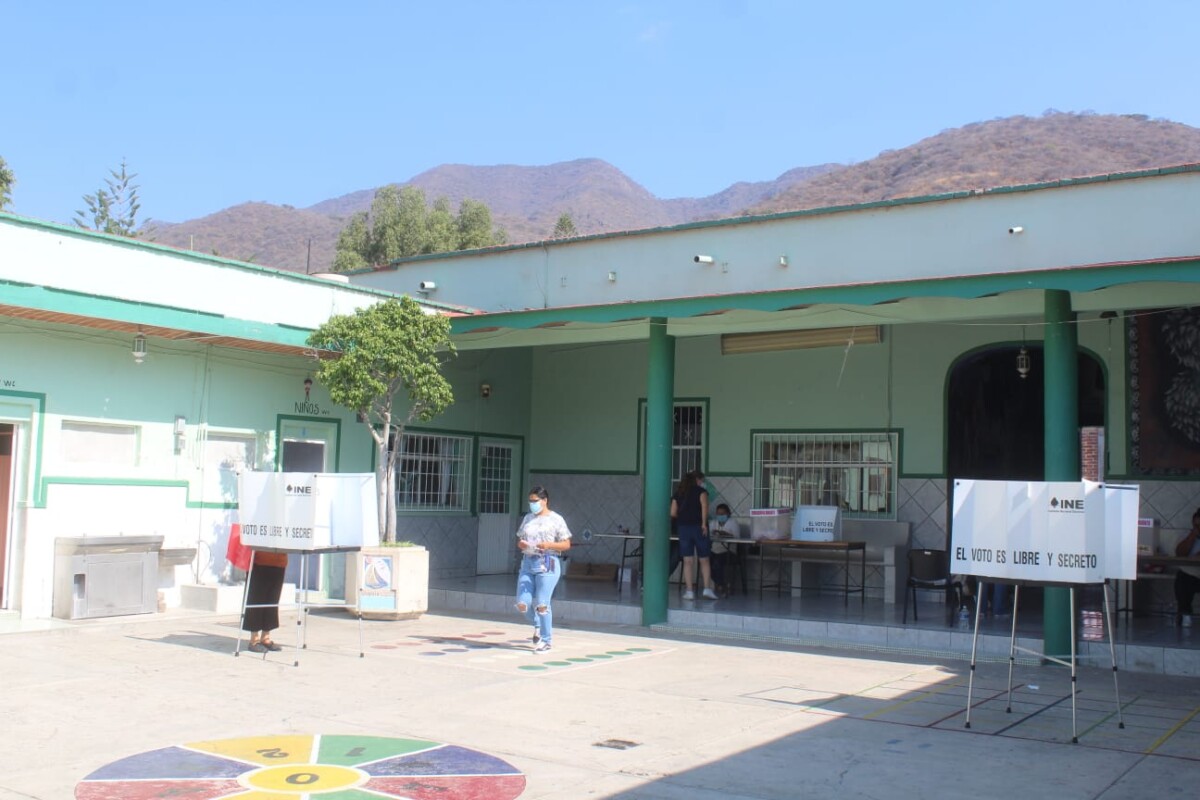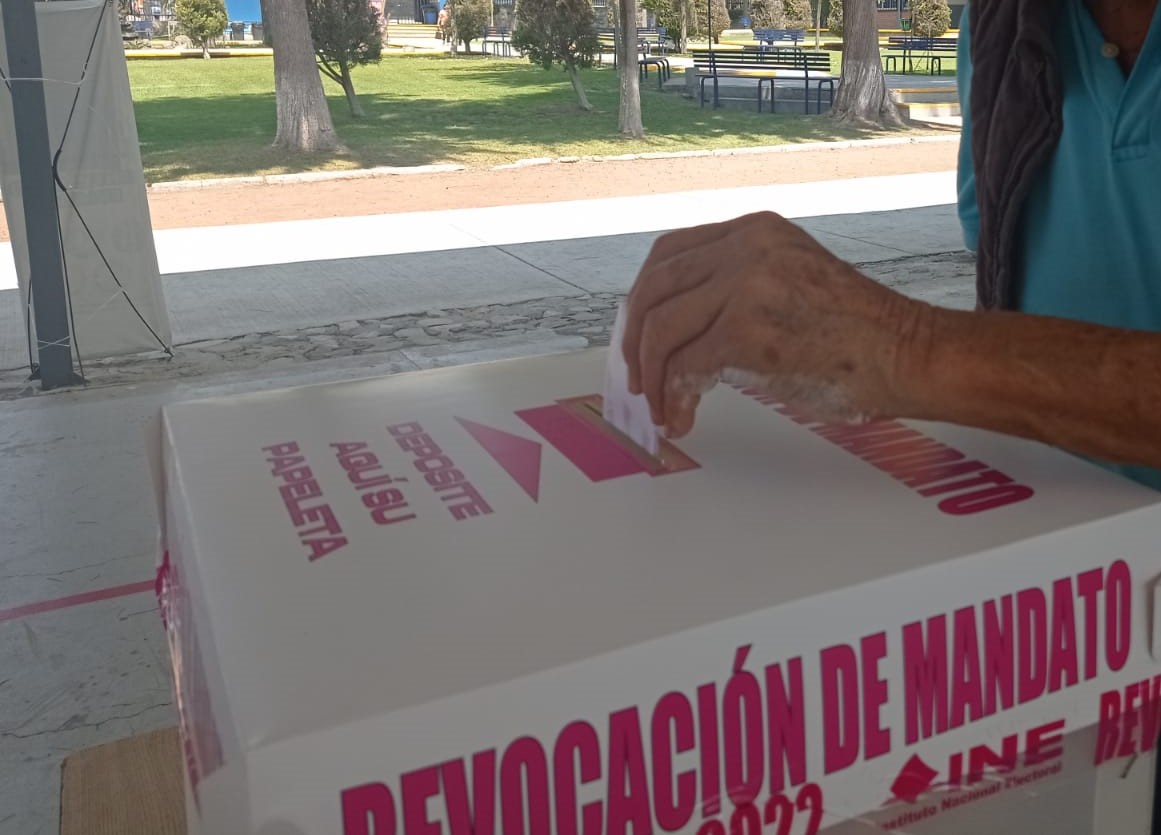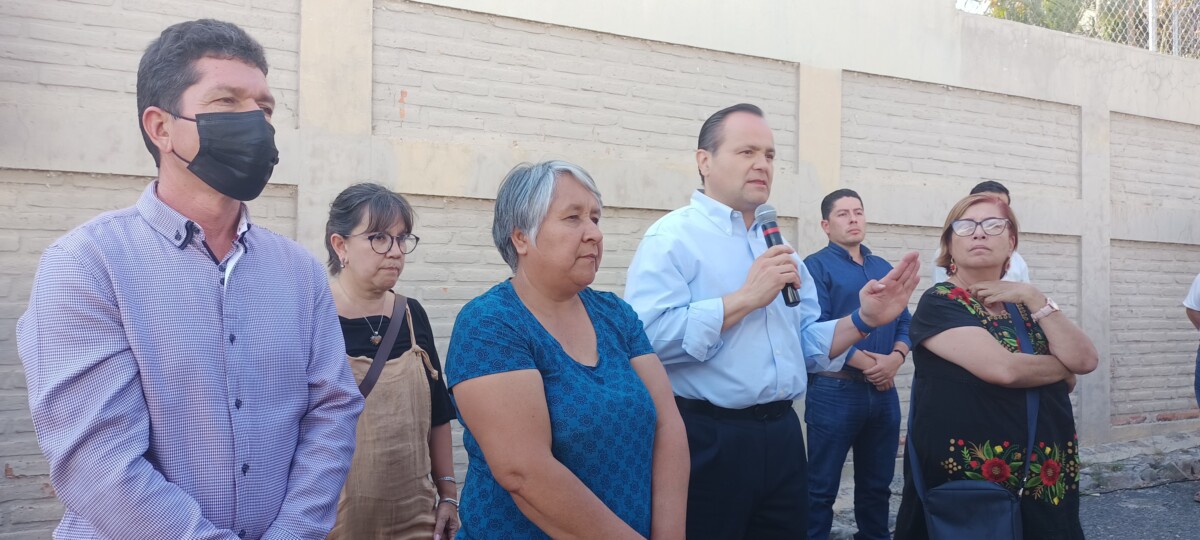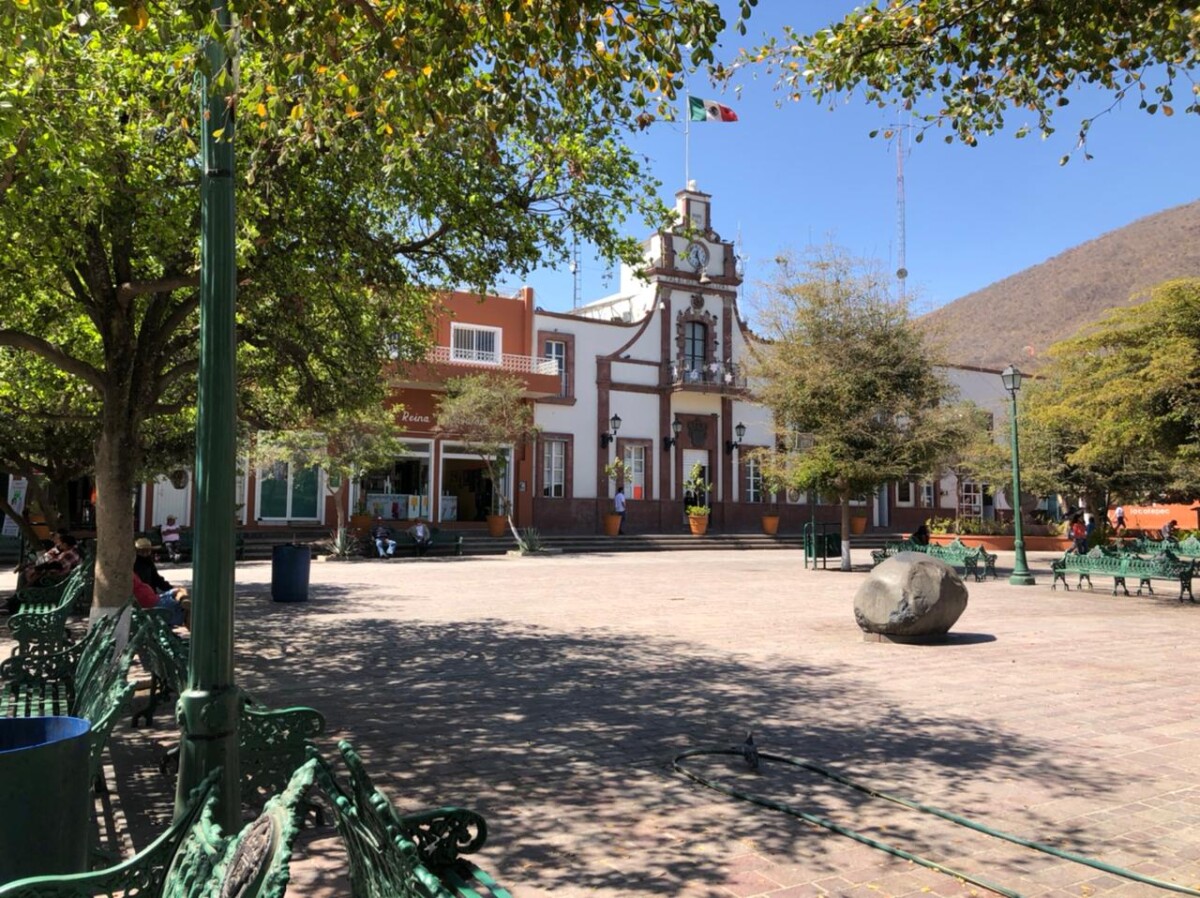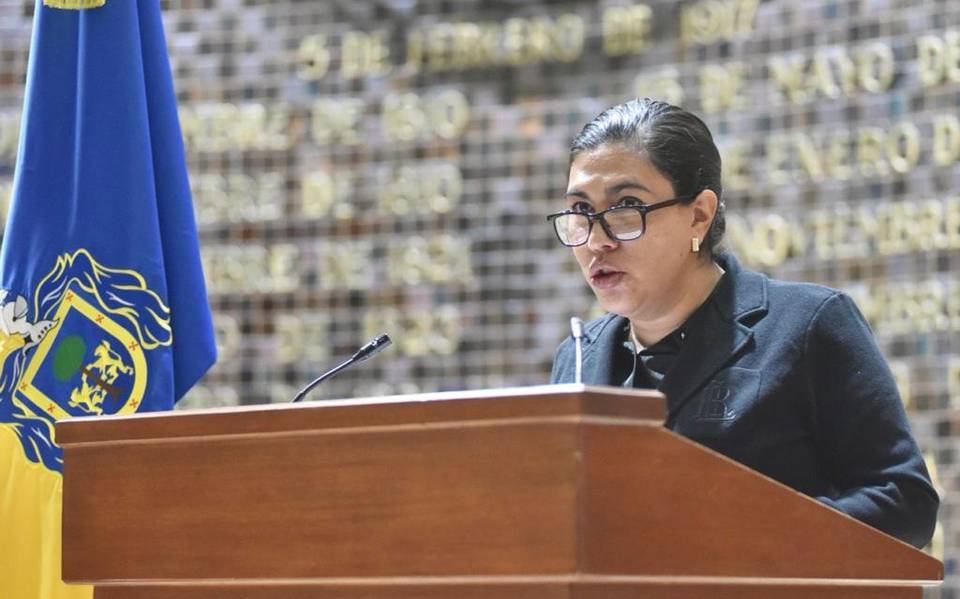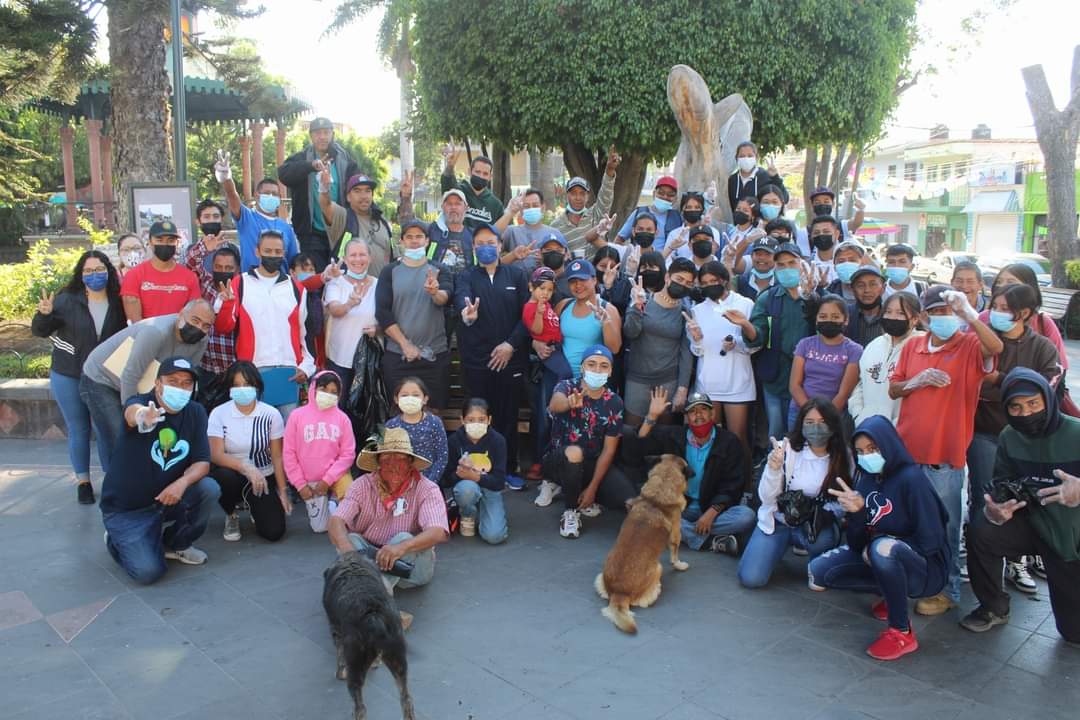Gobierno
OPINIÓN: FACETAS DE MÉXICO
Ignacio Ovalle Fernández, fue secretario particular del Presidente Luis Echeverría Álvarez. Foto: Cortesía.
Por: Pascacio Taboada Cortina y Jorge Martínez Cedillo
El organismo “Seguridad Alimentaria Mexicana”, Segalmex, creada por el presidente Andrés Manuel López Obrador al inicio de su administración, apenas transcurridos tres años y meses de gestión, cambió a su director general, Ignacio Ovalle Fernández y, en su lugar, nombró a Leonel Cota Montaño, ex gobernador de Baja California Sur y actualmente secretario ejecutivo del Sistema Nacional de Seguridad Pública. Esto, frente a una corrupción incontrolable en varias delegaciones estatales y regionales. Así, Segalmex, “lejos de apoyar a campesinos de escasos recursos, desnutridos y sin apoyos crediticios, los sumió en la pobreza y desesperanza”, es el comentario de millones de afectados.
Desde el momento del nombramiento de Ignacio Ovalle Fernández, como director general de este organismo público, descentralizado de la Secretaría de Agricultura y Desarrollo Rural, con funciones similares a las que tuvo en su tiempo la Compañía Nacional de Subsistencias Populares (Conasupo) se tuvo la sensación de que continuaría la corrupción en los procesos de recepción de cosechas, comercialización de granos con aplicación de precios de garantía “castigados” por las normas de calidad estrictas.
Ignacio Ovalle Fernández, abogado de profesión, después de haber sido secretario particular del Presidente Luis Echeverría Álvarez, ocupó la titularidad de la Secretaría de la Presidencia en el mismo Gobierno. En el siguiente, a cargo de José López Portillo, fue director general de COPLAMAR. Estuvo fuera del gobierno de Miguel de la Madrid, y regresó al servicio público durante la gestión de Carlos Salinas de Gortari, como director general de Conasupo.
En todos estos años, que fueron décadas, Ovalle Fernández acumuló una amplia experiencia en el sector público, sobre todo en la selección y control de personal, como para creer que fue descuido tanto mal manejo del presupuesto en los procesos de compra y venta de granos alimenticios, fertilizantes para el trabajo de los campesinos; mercancías que utiliza la gente modesta de los pueblos y algunas ciudades pequeñas o medianas, que son tantas con millones de habitantes, que se pierde la idea de la cuantía de fraudes en casi todos los estados de la República, donde se han denunciado fraudes sin que se sepa si los culpables han sido procesados penalmente o hayan “devuelto al pueblo lo robado”.
Ignacio Ovalle Fernández, luego de su sustitución en Segalmex fue nombrado por el presidente López Obrador, como coordinador del Instituto Nacional para el Federalismo y el Desarrollo Municipal, adscrito a la Secretaría de Gobernación.
Las irregularidades en el ejercicio del presupuesto y recursos de Segalmex, han ocurrido, por lo menos, desde hace más de dos años. Sin embargo, poco a poco han salido a la luz pública los fraudes de empleados y funcionarios del organismo. Uno de ellos, se refiere a la destitución, denuncia y procesamiento ante la Fiscalía General de la República, de tres directores de oficinas centrales de Segalmex, por irregularidades en transacciones comerciales y licitaciones. Las áreas administrativas señaladas, fueron las direcciones de Operaciones Comerciales de LICONSA y en la Unidad de Asuntos Jurídicos.
El mismo presidente de la República, durante el mes de febrero de este año, reconoció que la Auditoría Superior de la Federación (ASF) detectó irregularidades por más de 8 mil 600 millones de pesos en Segalmex, a través de sus áreas filiales de Diconsa y Liconsa. En esa oportunidad, el presidente se inclinó “por reunir todos los elementos acusatorios” y dijo que se estaba en proceso de investigación. Remató que “no podemos hacer juicios sumarios antes de contar con la información”.
En otra fecha, el 12 de abril recientemente pasado, un juez federal vinculó a proceso a René Gavira, ex jefe de la Unidad de Administración y Finanzas de Segalmex, por la presunta compra ilegal de 100 mil títulos bursátiles, con valor de más de 100 millones de pesos, con recursos económicos propiedad del organismo Segalmex.
Por otra parte, diversos medios electrónicos y escritos de comunicación, dieron fe de un estudio de la Secretaría de la Función Pública, que detalla una serie de irregularidades en la contratación de servicios de empresas, entre ellas una que no cuenta con empleados dados de alta en el IMSS, y otra, denominada Micro Credit, que no cuenta con una licitación pública, registrada ante la Secretaría de la Función Pública, a la cual Segalmex entregó una cantidad de 245 millones de pesos.
Esta es la triste historia de una empresa del gobierno, que ha fallado no sólo al gobierno federal, sino que ha dejado en la “quinta chilla” a millones de familias campesinas.
Cuenta Jalisco con abasto suficiente de antídoto para picaduras de alacrán
Al corte de la semana epidemiológica 13 del 2022, se reportan 8 mil 570 casos de picaduras de alacrán en Jalisco. Foto: SSJ.
Redacción.- Debido a la temporada de calor, al ser un estado endémico y por la ubicación geográfica en el llamado “Cinturón de Fuego del Pacífico”, en Jalisco se reportan más avistamientos y distribución de alacranes en distintos municipios, por ello la Secretaría de Salud Jalisco exhortó a la población a mantener medidas preventivas.
La SSJ informó que a la fech se cuenta con abasto del antídoto para el veneno de alacrán (faboterápico) en todos los Centros de Salud, Hospitales Regionales y Comunitarios del OPD Servicios de Salud Jalisco.
Las altas temperaturas ocasionan que, como toda fauna, los alacranes también busquen refugio, y es cuando salen de sus espacios para buscar sombra en las casas y cubrirse del sol, explicó la coordinadora estatal del Programa de intoxicación por artrópodos del OPD Servicios de Salud Jalisco, Alejandra Cornejo Magdaleno.
“El 80% de las picaduras se registran en casa, si ya se tuvo contacto con un alacrán lo primero que se debe hacer es mantener la calma, no automedicarse, ni utilizar ningún remedio casero pues esto dificulta el diagnóstico y, lo más importante, acudir de manera inmediata a una unidad de salud; si se atiende a las personas antes de los primeros 30 minutos el resultado es más favorable, los más vulnerables son niños y niñas menores de 5 años y adultos mayores”.
Cornejo Magdaleno agregó que la recámara es el principal sitio de agresión, por eso es de suma importancia seguir las principales acciones preventivas; mientras que las horas de mayor incidencia de picaduras, al ser los alacranes insectos cazadores de hábitos nocturnos son las 00:00 horas, las 12:00 del día, y las 21:00 horas.
Los principales síntomas de la picadura son dolor local, hormigueo, sensación de cuerpo extraño en faringe, hipersecreción de saliva, comezón, inquietud leve, dificultad para tragar y temblor en la lengua.
De igual forma el programa, comentó, se constituye de dos componentes: prevención y control físico y químico para evitar la propagación de alacranes y la atención y dotación de tratamiento para atender las intoxicaciones en todo el estado, en las 13 regiones sanitarias. En caso de picadura si se tiene oportunidad de colectar el alacrán y llevarlo a la unidad en un frasco de vidrio ayuda con el estudio entomológico para conocer la distribución de la especie.
CASOS
A nivel nacional, Jalisco es la entidad donde más picaduras de alacrán se registran; sin embargo, al corte de la semana epidemiológica 13 del 2022, se reportan 8 mil 570 casos, una baja del 11 por ciento en comparación al mismo periodo del 2021 cuando se reportaron 9 mil 646 picaduras.
MEDIDAS DE PREVENCIÓN
- Sacudir ropa, ropa de cama y toallas que hayan estado en el suelo o guardadas por mucho tiempo.
- Revisar y sacudir cunas antes de colocar a los bebés en ellas.
- Revisar y sacudir los zapatos siempre antes de calzarlos, ayudar a los más pequeñitos de casa a hacerlo.
- Colocar mosquiteros y cubrepolvos para evitar que el arácnido entre a nuestros hogares.
- Colocar zoclo dentro de las habitaciones, y si es posible alrededor de la casa, con el fin de evitar que trepen los animales.
- Reparar grietas u hoyos, eliminar material de construcción, madera, tabique dentro y alrededor del domicilio.
- Si realiza actividades que incluya la remoción de escombro y limpieza, proteger las manos con guantes de carnaza largos y gruesos.
Ajijic turnout low in presidential recall referendum
A total of 969 votes were counted in the three polling stations installed at Marcos Castellanos Elementary School. Photo: Sofía Medeles.
Sofía Medeles.- The three polling stations installed in Ajijic for the exercise of the Revocation of Mandate 2022 to which the President of the Republic, Andrés Manuel López Obrador (AMLO) acquiesced on April 10, registered low participation.
According to data from the National Electoral Institute (INE), there were a total of 969 voters in the three polling places in town. These were located in: the María Montessori Kindergarten which was for section 466; the Saúl Rodiles Piña Elementary School for section 467; and the Marcos Castellanos Elementary School, which had a nominal list for sections 468 and 469.
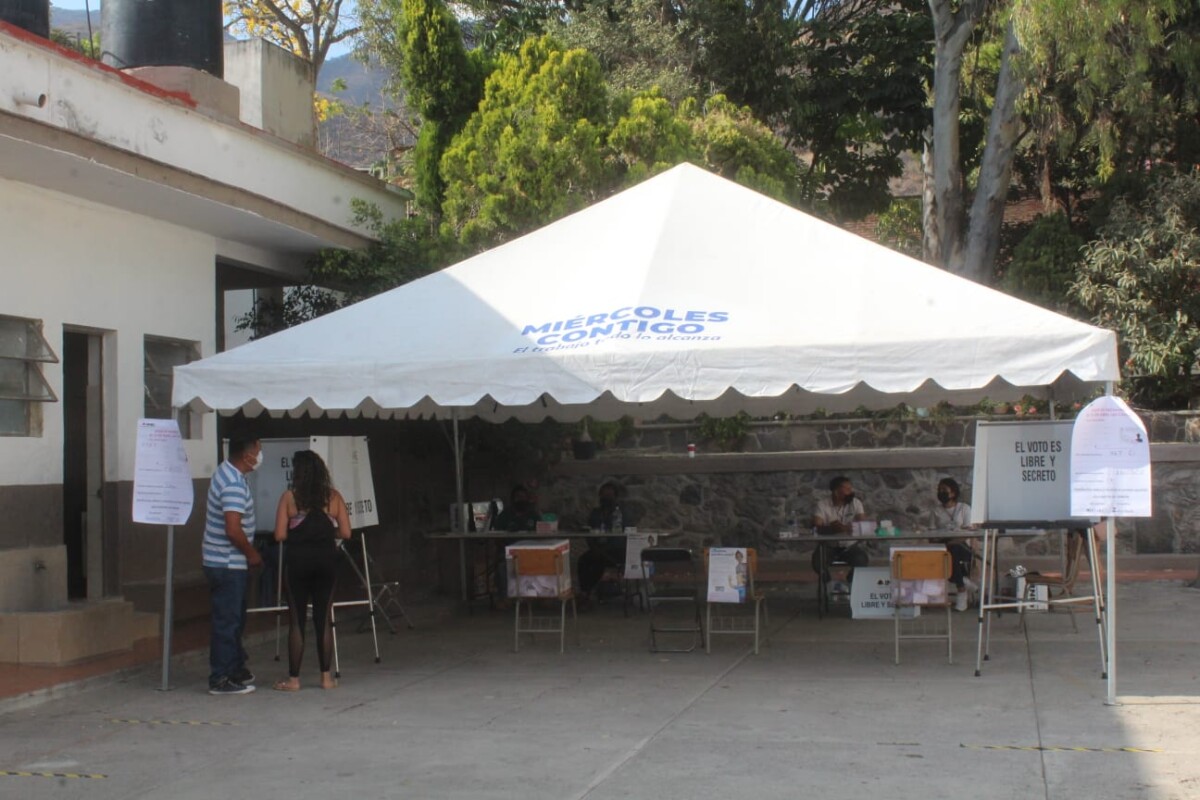
Ballot box at Saúl Rodiles Piña Elementary School. Photo: Sofia Medeles.
Each polling place had more than one thousand ballots available, according to the number of people on the nominal list. At Kínder María Montessori there were 294 votes registered; 255 for AMLO to continue in office, 31 to be recalled and eight null votes.
At Saúl Rodiles Piña Elementary School, 298 votes were counted: 269 in favor of AMLO, 19 votes against, and ten null votes. Finally, at Marcos Castellanos Elementary School, which had the largest turnout, 397 votes were recorded, of which 335 were for the permanence of the President of the Republic, 41 votes in favor of the recall and one null vote.
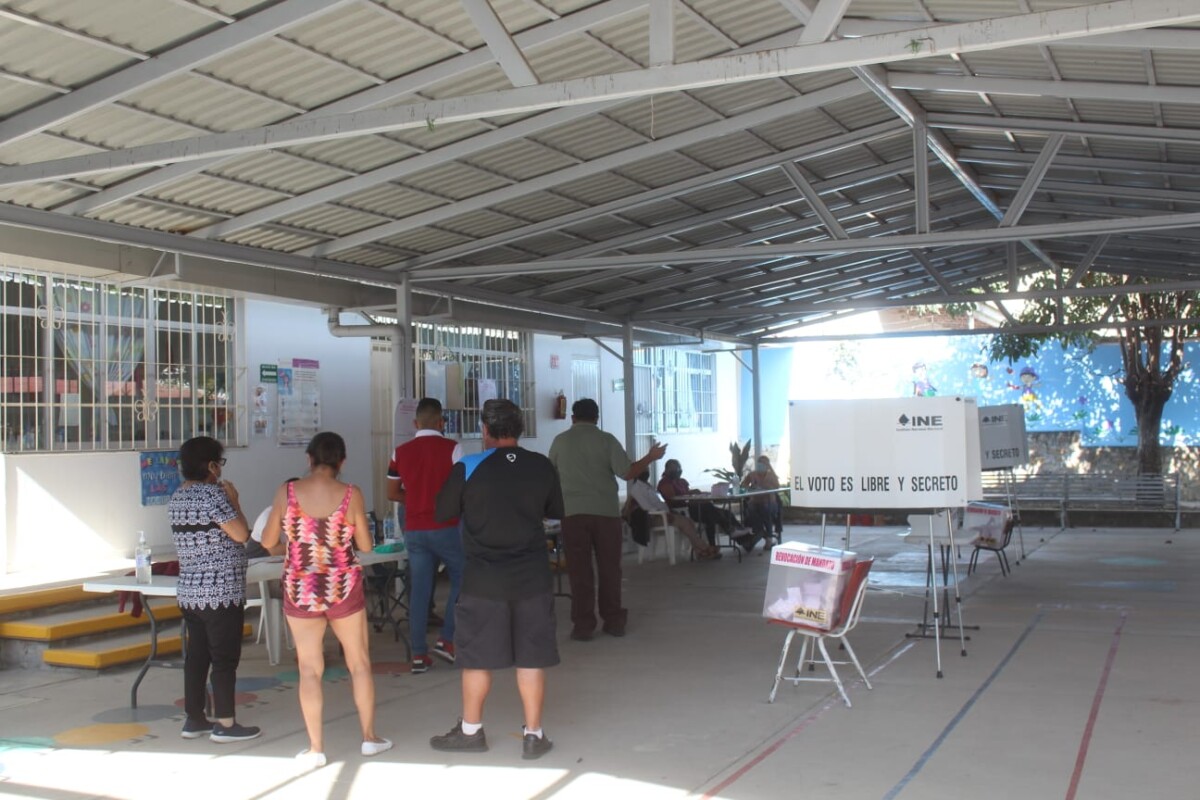
Ballot box at María Montessori Kindergarten. Photo: Sofía Medeles.
The three polling place officials in charge, Cesar, Lourdes and Jose Jorge, said that in spite of the fact that the polling place opened shortly after 8:00 a.m. and closed at 6:00 p.m., there were no incidents during the day. However, they pointed out the lack of participation was due to the lack of knowledge on the part of the population regarding this session.
Although on this occasion, participation was not as low as in the popular consultation on the trial of the former presidents held in August 2021. Sunday, April 10 was calm, according to the officials who attended the polling stations.
Translated by Sydney Metrick
Chapala president announces project to enhance Ajijic tourism
The president of Chapala, Alejandro de Jesús Aguirre Curiel, and the secretary of tourism of Jalisco, Claudia Vanessa Pérez Lamas
The president of Chapala, Alejandro de Jesús Aguirre Curiel, announced improvements for the Magic Town of Ajijic and the municipal capital to better accommodate tourists. The initiative is part of the project “Model of Magic Towns of Jalisco.”
Aguirre Curiel shared details of the improvements to infrastructure and tourism on social media. «The four elements of the project will create better conditions to receive visitors and show off the beauty of our Magic Town, Ajijic. The four areas are: study and improvement of circulation, creation of the position of tourist agent; study and improvement of the towns’ image; and waste management,» he said.
The president emphasized that the objective is to improve the quality of life both for people who are residents of the magic Town and for visitors. He states that «for Ajijic and for Chapala this news means a lot, because it strengthens economic and tourism growth, without losing the traditions and culture that identify us».
During the press conference held at Casa Jalisco on April 11, the first investment of 20 million pesos (about US$1 million) was announced for the start-up of the magic Towns Model in the nine magic towns of the state; during the year, for a total investment of 359.7 million pesos (about US$18 million).
Finally, Aguirre Curiel recognized the role of Governor Enrique Alfaro Ramírez in getting Ajijic designated a magic town, highlighting its traditions and excellent climate as some of its main attractions while acknowledging the influence of the residents of the expatriate community.
Translated by Elisabeth Shields
Mayor announces improvements and funding for Ajijic and Chapala
The mayor of Chapala (right) accompanied with the Jalisco Secretary of Tourism.
Editor.- Chapala Mayor Alejandro de Jesús Aguirre Curiel announced the projects to improve the Pueblo Mágico aspects of Ajijic and the tourist areas of Chapala in his presentation of the Model of Magic Towns of Jalisco.
Aguirre Curiel shared details of the project and the funds to improve infrastructure and tourism on social media.
«This project consists of four thrusts that will allow our Pueblo Mágico, Ajijic, to better receive visitors and show off its beauty: Analysis and improvement of mobility in the town; Establishing a Tourist Agent; Analysis and improvement of its visual presentation; and waste management».
The mayor emphasized that the objective is to improve the quality of life of the people who live in Ajijic and the people who visit it, so he considered this an important policy «for Ajijic and for Chapala this news means a lot, because it strengthens the economic and touristic growth of our municipality, without losing the traditions and culture that identify us».
During the press conference held at Casa Jalisco on April 11, a first investment of 20 million pesos was announced for the start-up of the Magical Towns Model in the nine towns of the state that have this distinction.
Finally, Alejandro Aguirre, recognized the influence of Governor Enrique Alfaro Ramírez in the designation of Ajijic a Pueblo Mágico, highlighting its traditions and excellent climate as some of its main attractions, without forgetting the influence of the retired residents of the Expat community.
Translated by Patrick O’Heffernan
Less than ten percent of District 17 voters participated in the recall election
Only 27,168 cast their vote in the lake area.
Héctor Ruiz Mejía.- Only 9.97 percent of the electorate in District 17 participated in Sunday’s vote on the Revocation of Mandate on Andrés Manuel López Obrador (AMLO).
Of the 272,259 people who were expected to go to the polls on April 10 in the 15 municipalities that make up the district, only 27,168 cast their vote. Of these, 25,270 voted in favor of AMLO’s continuation as president, 1,548 voted to revoke his mandate and 350 left their ballot blank.
Between Chapala and Jocotepec, seven thousand two votes were cast, of which six thousand 351 were in favor of AMLO, 558 against him, and 100 were null votes.
Nationally, voter participation was also low, according to INE only between 17 and 18.2 percent of those registered on the nominal list cast their vote; Jalisco registered 9.06 percent, one of the states with the lowest participation. The election had no impact because, it required at 40% of the current electoral roll.
Translated by Patrick O’Heffernan
Chapala’s City Hall presents major water treatment and drainage project for Riberas del Pilar
Chapala Municipal president, Alejandro de Jesús Aguirre Curiel, with microphone in hand, the municipal agent Ana María Huerta Rivera, the councilman of Riberas del Pilar, Jesús González Amezcua, and two of the members of the new neighborhood committees.
Jazmín Stengel (Chapala).– The Chapala City Council presented a project for the installation of a sewage system to benefit the population of the Riberas del Pilar. The work is estimated to cost 68 million pesos, to be paid in equal parts by the municipal government and by residents. The Council claims that the properties that currently have private septic systems are contaminating the environment and the project is needed.
After introducing Ana María Huerta Rivera as agent for Riberas del Pilar, and asking the residents to watch for increasing shoreline invasions of federal zones, President Alejandro de Jesús Aguirre Curiel, presented the details of the project.
«This is a proposal, which consists of installing much-needed drainage. It also includes a water treatment plant. We have to do this together, the municipal government and each one of the taxpayers.» He added that the proposal has been reviewed for feasibility.
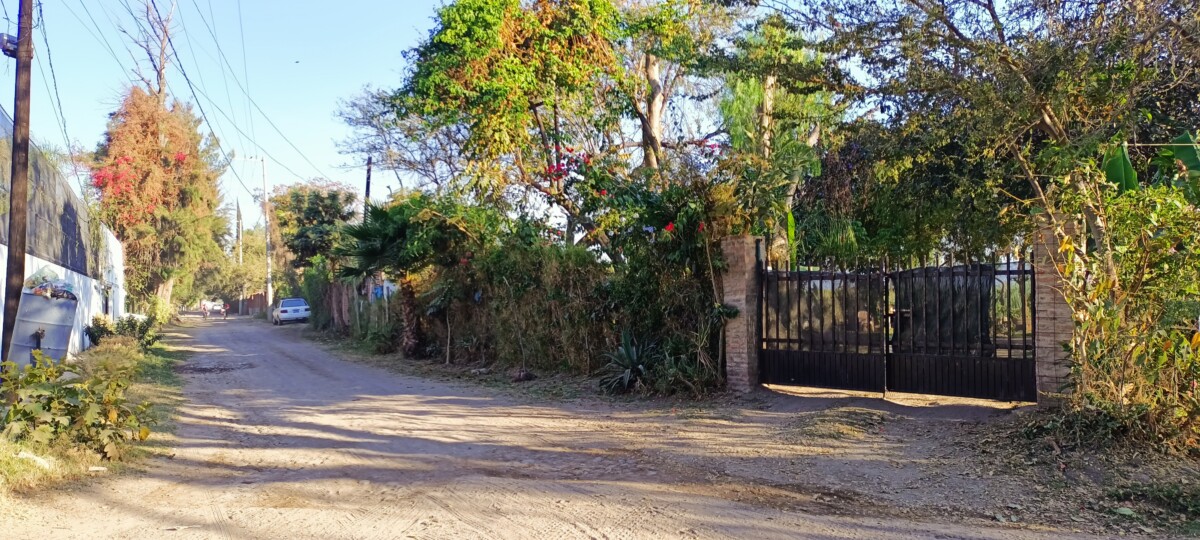
The plant would be built on Paseo del Lago street, on the corner of San Mateo towards San Lucas street, in the Riberas del Pilar municipal agency. Credit: Jazmín Stengel.
The project, presented on April 5, includes drainage lines, a modular treatment plant which would be located between San Lucas and San Mateo streets on the shores of the lake, and the connector. It would be built out in one single six-month stage.
The current municipal administration asked residents to agree to the 50/50 cost split. Cost-sharing is necessary as there is not any available support from federal or state programs. In addition, officials said that they need 25% of the total cost of the project in advance to start the work. Residents have about 45 days to contribute the first 17 million pesos. If the funds are not raised, they will be returned to those who have contributed. The deadline was established by the approximately fifty residents present at the meeting. Government representatives assured that they had 34 million pesos available for the project.
In order to collect the remaining 34 million pesos from Riberas del Pilar residents, each homeowner will be charged 70 pesos per square meter of land, business owners will be charged 100 pesos per square meter. Riberas del Pilar covers 237 hectares, and contains about registered 1,500 properties.
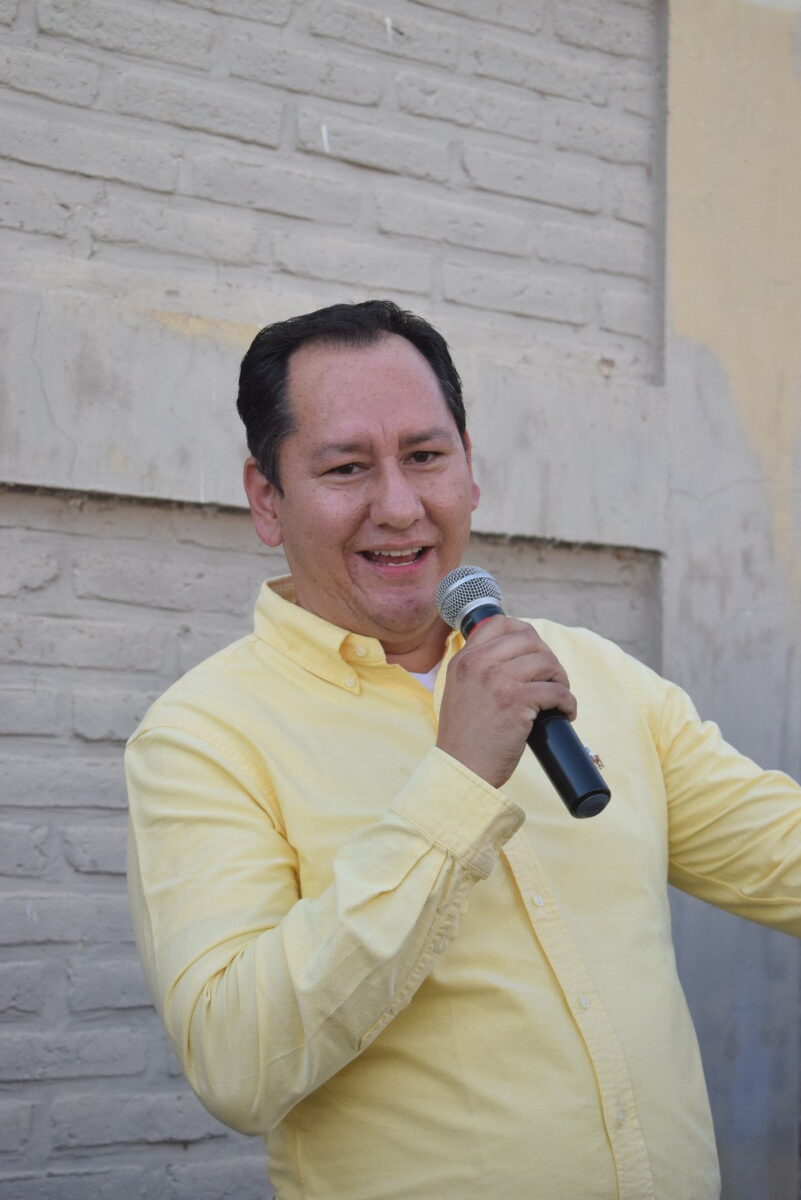
Fernando Antonio Monreal Mendoza, engineer in charge of the work and director of the Municipal Potable Water and Sewage System (SIMAPA).
There will be two ways to quote the fee and make the corresponding payment. The first is bring your property deed Municipal Water and Sewage System (SIMAPA) office, located in the new administrative unit located 62 Hidalgo Avenue. The second option is to wait for the formation of one of four neighborhood committees that are expected to be formed.
Connections from the houses to the public sewage system are not included in the cost of the project, or in the fees collected. Homeowners and business owners will be responsible for their own costs to connect to the system. Current estimates are 14,000 – 18,000 pesos per house. Officials said that anyone who does not pay the required fees for the project will not have the right to connect to the public drainage, and will be fined in the future for environmental contamination.
Present for a short time during the meeting were the municipal president Alejandro de Jesús Aguirre Curiel, the director of the Municipal Potable Water and Sewage System (SIMAPA) Fernando Antonio Monreal Mendoza, Juan Carlos Pelayo, advisor to the City Council, as well as council members, and the recently-appointed delegado, Ana María Huerta Rivera.
Translated by Amy Esperanto
Despite ‘no budget’ Jocotepec’s City Hall payroll increases
Last year, the Government of Jocotepec registered a total of 547 civil servants. Photo: File.
Héctor Ruiz Mejía (Jocotepec).- Despite the fact that authorities claim that the municipality of Jocotepec has a limited budget, during the last four years the number of City Hall workers increased from 398 to 547.
According to a report issued by the Tax Administration Service (SAT) under folio number 22NA4165087, corresponding to fiscal years 2018 to 2021, the municipality increased its workforce by 37.43% during that period.
Although in daily discourse, the municipal president of Jocotepec, José Miguel Gómez López, states that Jocotepec has little budget, the information obtained through transparency shows the opposite.
In 2018 City Hall had 398 workers; this increased to 540 in 2019 and dropped to 534 in 2020. In 2021, 547 City Hall workers were on the payroll.
Total salaries and wages of civil servants as reported increased the budget by 25.17%.
In 2018, the municipality of Jocotepec paid a total of 52,560,210.72 pesos (about US$2.6 million); in 2019 the amount was 56,743,975.04 pesos (about US$2.8 million). In 2020 it increased to 67,505,644 pesos (about US$3.3 million).
2021 closed with a payroll expense of 65,789,990 pesos (about US$3.28 million) together with a section of salary exempt payments of 3,143,411 pesos (about US$157,000) totaling 68,933,401 pesos (about US$3.44 million).
After the cutback of federal funds, the municipal president reduced the salaries of councilmen 50% and salaries of employees in positions of trust 30 percent as a cost saving measure. Despite these reductions to payroll, 2021 was the year in which the most money was spent on salaries.
Translated by Nita Rudy
In ‘act of congruence,’ Congresswoman Maria Dolores Lopez Jara promotes sexual diversity reforms
District 17 Deputy Maria Dolores Lopez Jara. Photo: El Occidental.
Redaction.- District 17 Deputy Maria Dolores Lopez Jara said she was in favor of the package of legal amendments to recognize equal marriage, gender identity and the prohibition of conversion therapies.
From the tribune of the Congress of Jalisco, the legislator from Jocotepec defended initiatives aimed at recognition of LGTBTTIQ+ community rights. López Jara stressed that the law should not support privileges for one group of people over another.
“In this country there are no first- and second-class people,” she said. “Human dignity is what counts. Our value is in how human we are – how good or wrong we are, not for what we prefer or what we like. To put it simply, human dignity is not bargained. I insist – there are no first- or second-class people,” she emphasized.
Saying that even if it represents her “political tomb,” López Jara defended human rights over political repercussions, as an act of congruence with her person and her family.
“I don’t know what legacy you want to leave,” she said with emotion. “I just want to leave a legacy for my daughter, and that is called congruence. I want to tell you – neither my love nor my family is less worthy than yours, yours or yours.”
The three initiatives were approved by the local Congress on Thursday, April 7, in a session that lasted until the wee hours of the morning.
Translated by Mike Rogers
New Ajijic street cleaning program
Attendees of the first garbage collection program. Photo: Alejandro Aguirre Curiel
Sofia Medeles (Ajijic).- A new clean-up program started in Ajijic on April 2nd. Dozens of young people, children and municipal authorities participated in the cleaning of several streets in the downtown area.
On this occasion, students from the Centro de Estudios Técnicos en Aguas Continentales (CETAC) were invited to support the program. The person in charge of the program, Maximiano Macias Arceo, said that at least 12 children joined in the cleanup. Also present were the municipal president of Chapala, Alejandro de Jesús Aguirre Curiel; the councilwoman of the delegation, Denisse Michelle Ibarra; the municipal trustee, Gamaliel Soto Pérez; and other workers of the delegation.
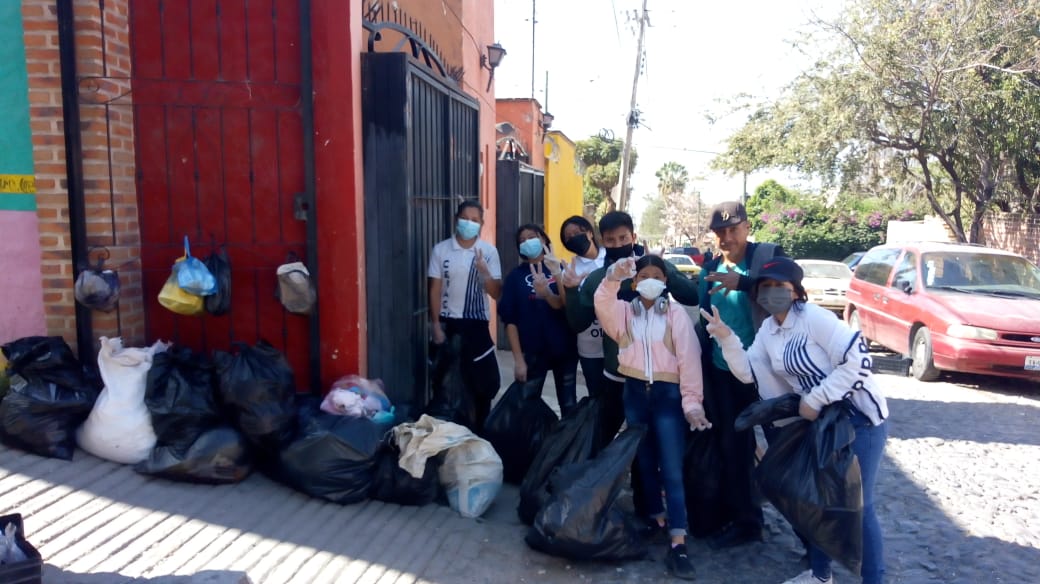
Young people during the garbage collection in the streets of Ajijic. Photo: Maximiano Macias Arceo
The students who attended were provided with refreshments donated by several people, including Ajijic councilwoman Denisse Michelle Ibarra, trustee Gamaliel Soto Pérez and a member of the group Unidos por Ajijic (United for Ajijic). Stickers for trash cans and waste containers were also provided.
Although Macías Arceo was pleased that the work session had gone well, he said that both he and the participants were saddened that again there was garbage in the streets after the cleaning brigade.
«During the tour, some people said that they remembered the work of Juanita, ‘La Japonesa,’ (a devoted member of CASA, of the Lake Chapala Garden Club, the Lakeside Garden Guild, the LCS, and of other civic-minded organizations who taught and worked with local children to beautify Lakeside) and hoped that we can achieve similar results. We want to revive that culture of cleanliness and control of garbage in the streets», he added.
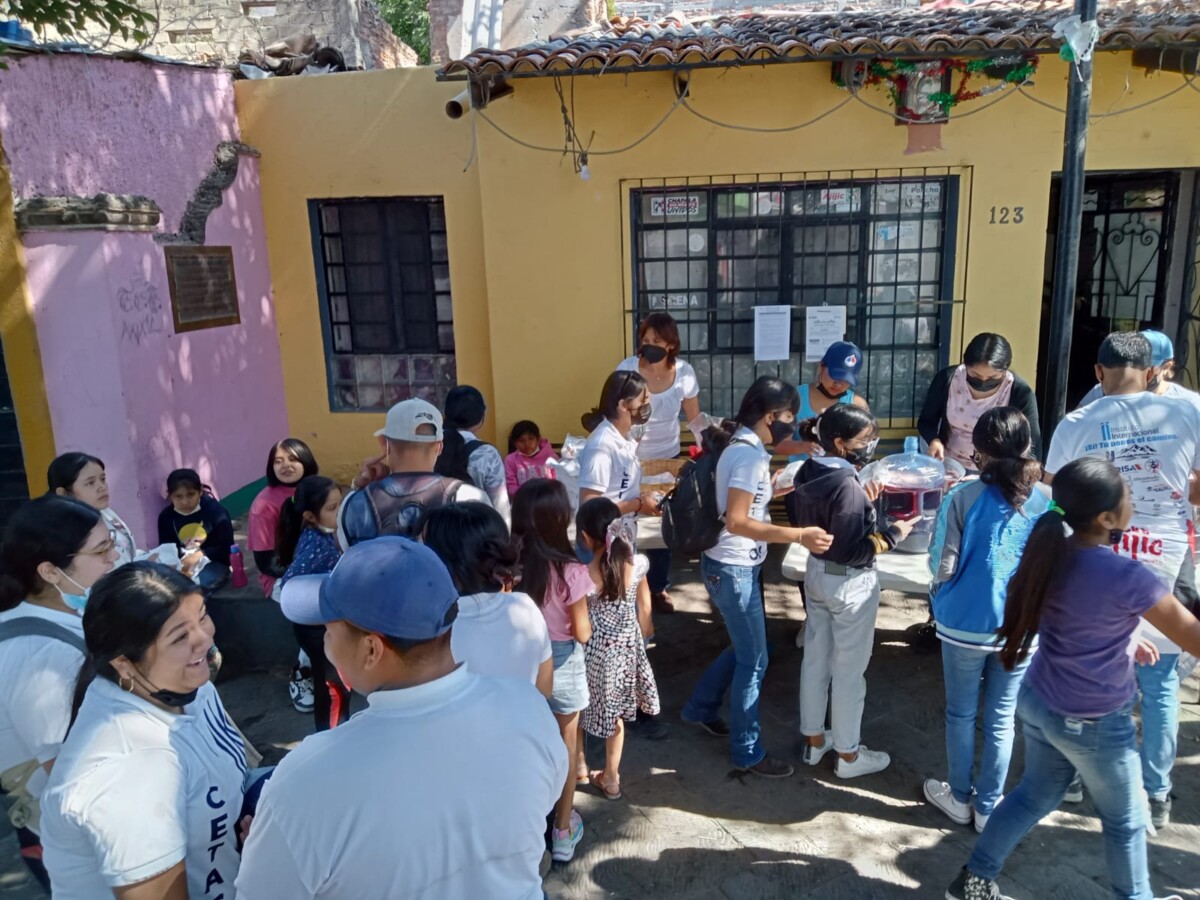
Children receiving snacks donated by public officials. Photo: Maximiano Macias Arceo
Macías Arceo said both donations and volunteers are welcome for future work sessions. The dates will be announced several days in advance on the Facebook page «Delegación Ajijic 2021-2024» and in local media. «The next date will be after Easter vacation. We will invite more schools to cooperate, whether public or private, because we want everyone to become aware and participate in cleaning the streets,» stated Macías Arceo.
Translated by Elisabeth Shields
© 2016. Todos los derechos reservados. Semanario de la Ribera de Chapala


